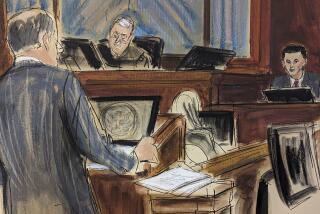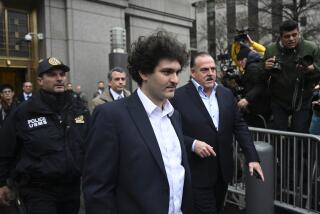3 Britons Arrive in Houston to Face Trial
- Share via
HOUSTON — Three British bankers were extradited to Texas on Thursday to face Enron Corp.-related charges filed more than four years ago in a case that sparked a political storm over a treaty used to bring them across the Atlantic Ocean.
They arrived Thursday afternoon, in custody of U.S. marshals. They were taken to a federal detention center to await their first appearance in court today.
Their years-long extradition battle ended earlier this year when they lost the last of a string of appeals. The former executives at Greenwich NatWest, a unit of Royal Bank of Scotland Group, became a cause celebre in Britain because of the controversial treaty used to pursue their extradition.
David Bermingham, Gary Mulgrew and Giles Darby are accused of colluding with former Enron Chief Financial Officer Andrew Fastow in a secret financial scam to enrich themselves at their employers’ expense. They have consistently denied any wrongdoing. They initially were charged in June 2002, just a few months into the Justice Department’s sweeping investigation of Enron’s December 2001 collapse.
The bankers have fought extradition since their April 2004 arrest in London. Their case has garnered heavy interest in Britain, with the BBC broadcasting their plane’s takeoff live from London after they surrendered.
Both the House of Lords and the House of Commons mounted symbolic debates this week before the three men’s departure to protest Britain’s compliance with a 2003 extradition treaty that has not been ratified by the U.S. Senate. Several legislators lambasted Prime Minister Tony Blair’s government and the U.S. failure to ratify the treaty.
“We’ve been let down by our government,” Bermingham said shortly before he boarded the plane for Texas.
On Friday, U.S. Magistrate Stephen Smith in Houston is likely to consider whether to grant bail that would allow the bankers to return to Britain to await trial.
The men are each charged with seven counts of wire fraud and face a maximum of 35 years in prison if convicted.
More to Read
Sign up for Essential California
The most important California stories and recommendations in your inbox every morning.
You may occasionally receive promotional content from the Los Angeles Times.










